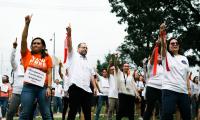Responses to violations against human rights defenders require solid data

This summer, two staff members of Afghanistan Independent Human Rights Commission were targeted by an explosive device while travelling to the Commission’s office in Kabul, both dying from their injuries. In the Philippines, the Congress has recently passed a new Anti-Terrorism Act, which contains extensive enforcement powers that will enable government to silence human rights defenders. In Thailand, human rights defenders continue to face threats and intimidation from the private sector for speaking out against environmentally and socially destructive development projects.
These examples -among many others- offer stark illustrations of some of the risks that human rights defenders face in their defense of human rights across the Asia Pacific. Risks that have only been intensified since the onset of the COVID-19 pandemic. In order to strengthen the protection of human rights defenders in the region, representatives from eight different member institutions of the Asia Pacific Forum of National Human Rights Institutions (APF) are currently finalising a comprehensive regional action plan on human rights defenders, that describes how the civic space is shrinking in the region. The plan contains thorough context analyses and case stories that exemplify the challenges human rights defenders are facing and how they are currently responding to them, as well as sets of both regional and national actions, that the APF and its 25 member institutions will implement by 2025 to improve respect for the rights of defenders in the region.
We need regional data on violations
One of the actions highlighted in the comprehensive plan is the need for collecting data on violations against human rights defenders both at regional and national levels.
“Having robust data and statistics that describe the landscape for human rights defenders in the region will allow the APF to respond much more effectively to violations where and when they take place. Some of our members are hearing complaints from defenders and are already monitoring and reporting violations. However, we plan to support them to strengthen the data they are collecting and reporting on,” Phillip Wardle, the APF’s Legal and Policy manager, who is supporting the development of the action plan, explains.
Another key action highlighted in the action plan is the facilitation of human rights defenders’ access to receive help and protection, when they are at risk of reprisals, receive death threats or for any other reasons fear for their lives.
Strengthening defenders' access to relocation
Across the region several relocation and respite programmes offer the possibility to human rights defenders to be relocated to a safe environment in another country, while at the same time enhancing their skills so that they can work more effectively when they return home. However, in many countries, human rights defenders, especially those living in remote and conflict-ridden areas, don´t know about the programmes.
“National human rights institutions can play a key role in spreading awareness of these programmes. They can connect with other defenders in their home countries and they can assist them with applying to access these programmes,” Phillip Wardle says.
The development of the regional action plan is supported by the NHRI EU Project, which is led by the Danish Institute for Human Rights. Read more here.
The regional action plan is primarily a policy commitment by APF members to guide their work for the next four years. However, as it will be published and disseminated broadly in at least four different languages it will also be an important source of information for other human rights defenders on what kind of programmes will be available to them to protect and promote their rights.
“As a result of these commitments and the support of our partners, we are confident that the situation of human rights defenders will be strengthened across the region. The document will also help guide APF’s engagement with international partners in the region,” Phillip Wardle says.
